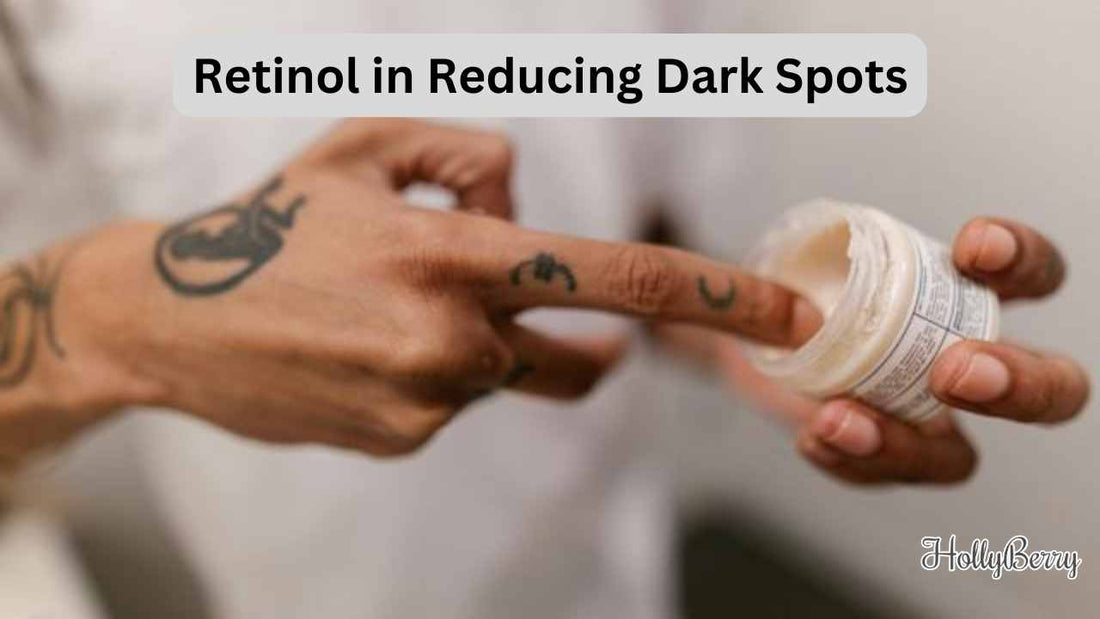
Retinol in Reducing Dark Spots
Share
Efficacy and Application Tips

Retinol is a derivative of Vitamin A and a potent skincare ingredient prominent among products claiming to reduce hyperpigmentation, specifically dark spots. It operates at the cellular level, where it is touted to enhance the turnover rate of skin cells and facilitate the production of new cells.
This effect not only helps in fading dark spots but also generally improves the skin's tone and texture.
Studies have shown that retinol can stimulate collagen production, which may indirectly aid in the diminution of dark spots by improving skin resilience and reducing the concentration of melanin in certain areas.
Continuous use of retinol has been observed to yield significant improvements in the visual appearance of hyperpigmentation.
Skin treated with retinol typically reveals reduced fine lines and a more even skin tone over time.
The efficacy of retinol in addressing the issue of dark spots and other signs of ageing is reinforced by multiple peer-reviewed scientific studies which have noted its potential in topical and oral forms.
While retinol is generally considered safe for a wide range of skin types, its potency requires a mindful approach to usage, as excessive application can lead to dryness, peeling, or irritation.
Thus, it is frequently recommended to gradually introduce retinol into a skincare regimen, allowing the skin to adapt to its effects. With due consideration to individual skin sensitivity, retinol emerges as a formidable ally in the quest for clearer, more youthful skin.
Science of Retinol and Skin Pigmentation
Retinol, a derivative of vitamin A, plays a significant role in skin repair and melanin regulation. Its efficacy is evidenced in its ability to improve skin appearance, particularly in reducing pigmentation issues.
Role of Retinol in Skin Repair
Retinol aids in skin repair by accelerating cell turnover and stimulating collagen production. Collagen is essential for maintaining skin elasticity and firmness. Retinol's ability to promote collagen synthesis helps in the reduction of fine lines and in the improvement of skin texture. Clinical studies have shown that retinol can significantly diminish the appearance of aged features, such as wrinkles and uneven skin tone.

Retinol serum 500ml
Mechanism of Retinol on Melanin Production
Retinol affects melanin synthesis through the inhibition of tyrosinase, an enzyme vital for melanin production. By hampering tyrosinase activity, retinol helps in preventing the formation of excess melanin.
This results in a more even skin tone and the lightening of hyperpigmented lesions. Treatments with retinol have demonstrated a reduction in epidermal melanin, with studies noting a 36% decrease in pigment with its application.
Application and Efficacy
Retinol, a form of vitamin A, is widely acknowledged for its potential to diminish the appearance of dark spots. Tapping into its full effectiveness requires understanding its application protocols, various formulations and concentrations, as well as analysing documented efficacy results.
Guidelines for Retinol Use
Retinol should be applied to clean skin, typically during the evening routine to avoid sunlight degradation. Beginners should start with a lower concentration, using the product sparingly to allow skin to build tolerance. Photoprotection, in the form of wearing sunscreen during the day, is essential when using retinol to prevent further UV-induced pigmentation.
Retinol Concentrations and Formulations
Retinol is available in multiple concentrations, ranging from 0.25% to 1% for over-the-counter products, while prescription-strength formulations may be higher. Creams and serums are the most common formulations, each designed to cater to different skin needs and preferences.
| Concentration | Formulation | Purpose |
|---|---|---|
| 0.25% | Serum/Cream | Mild treatment and beginners |
| 0.5% | Serum/Cream | Moderate treatment |
| 1% | Cream | More pronounced pigmentation |
| Prescription | Gel/Cream | Severe cases and medical guidance |
Efficacy Studies and Results
Clinical trials have solidified retinol's reputation in effectively reducing dark spots, with a consistent application leading to visible improvements. One study demonstrated a 40% reduction in pigmentation with the combination of oral and topical treatment. The evidence indicates that retinol not only helps in pigmentation issues but also enhances overall skin texture and tone.
